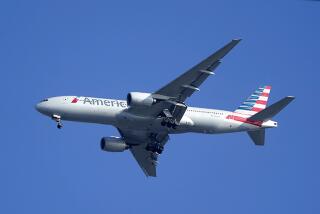New Era in Airline Ads
- Share via
Congress and the U.S. Department of Transportation have recently made several moves aimed at forcing airlines to be more forthright in their dealings with the public.
Now, for example, on-time performance records must be posted monthly. Also, an effort is being made to enforce denied boarding overbooking compensation requirements.
However, some law enforcement authorities still don’t think enough is being done to protect passengers from air carrier evasiveness and misrepresentation. The result is that they have issued disclosure guidelines of their own.
The attorneys general of the 50 states have joined in a program to bring more openness and clarity to the airline/consumer relationship.
One of the major guidelines drawn up by the National Assn. of Attorneys General and effective Friday is that airlines disclose more details clearly in print when advertising discount fares.
Small-type notations, such as “some restrictions apply” or “seats are limited,” no longer will be acceptable.
Different Fares
Airlines that advertise a discount rate on a “capacity limited” basis, without making enough seats available at that price to meet foreseeable demand, also will be be in trouble.
Many carriers, according to the attorneys general, offer only a token number of fares at the advertised rock-bottom price, luring possible customers so they can be “sold up” to more expensive fares.
Under the new guidelines, if a specific fare isn’t available on all flights, advertisements must clearly indicate so in “clear and conspicuous” type.
The group also is against advertisements that spell out messages such as “L.A.-New York: $99” in huge type, and, underneath, in tiny print, add “round-trip purchase required.”
I have always believed such advertising is a shabby practice.
Suppose I only want to go one way? If a $99 fare can only be purchased as part of a $198 fare, the airline should say so in easy to read print.
Now the ads will have to indicate the round-trip fare in letters at least as big as those used to show the one-way price.
Another area in which the attorneys general are taking a tougher line is frequent-flier programs. The general feeling is that travelers who have earned mileage rewards don’t always get them as easily, or as willingly, as they should.
Airlines sometimes change the terms and conditions of their frequent-flier programs, sometimes forcing customers to re-earn free or discounted transportation. Under the new rules, customers have at least a year after the mileage requirements are changed to take advantage of any reward already earned at the old terms.
And the airlines will be expected to fully disclose all blackout and capacity restrictions on travel awards. Even when they do, they will have to provide earned travel awards “within a reasonable period” of the passenger’s request date.
Airlines that fail to comply with the association’s new guidelines will face prosecution under state laws.
Regulation Responsiblity
Will the changes work?
The airlines and the Department of Transportation believe otherwise--that regulation of most airline activities is the department’s responsibility. A number of legal experts outside the industry support that position.
The association says that states frequently set higher standards for themselves than those mandated by the federal government in areas of environment, public health, etc., and believes the new airline regulations are another such situation.
The department, for example, does not require that the round-trip price be shown prominently, or at all, when advertising low, one-way fares that can only be bought as a round trip. The association is insisting that the airlines go beyond the minimum federal requirement.
According to the department, a carrier may advertise a fare and then tack on special surcharges separately. The national policy doesn’t provide enough protection for consumers, the association says.
A California law enforcement official says: “We, not the DOT, have jurisdiction over misleading advertising within our own states. And we think that’s what the airlines often engage in.”
But the matter may not rest there. An airline could decide to challenge the attorney general in a selected state on the grounds of jurisdiction. Or the department could argue that it is being preempted, and resort to the courts for relief.
For the moment, the guidelines are in place. What matters now is how diligent the attorneys general are in enforcing those guidelines.
More to Read
Sign up for The Wild
We’ll help you find the best places to hike, bike and run, as well as the perfect silent spots for meditation and yoga.
You may occasionally receive promotional content from the Los Angeles Times.






